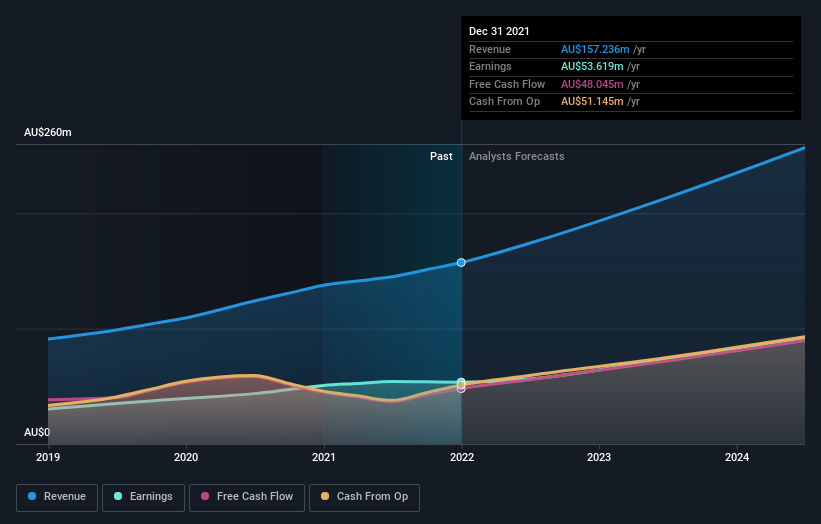- Australia
- /
- Capital Markets
- /
- ASX:NWL
Following recent decline, Netwealth Group Limited's (ASX:NWL) top shareholder CEO Michael Heine sees holdings value drop by 3.1%
To get a sense of who is truly in control of Netwealth Group Limited (ASX:NWL), it is important to understand the ownership structure of the business. The group holding the most number of shares in the company, around 56% to be precise, is individual insiders. In other words, the group stands to gain the most (or lose the most) from their investment into the company.
As market cap fell to AU$3.0b last week, insiders would have faced the highest losses than any other shareholder groups of the company.
In the chart below, we zoom in on the different ownership groups of Netwealth Group.
See our latest analysis for Netwealth Group

What Does The Institutional Ownership Tell Us About Netwealth Group?
Institutions typically measure themselves against a benchmark when reporting to their own investors, so they often become more enthusiastic about a stock once it's included in a major index. We would expect most companies to have some institutions on the register, especially if they are growing.
We can see that Netwealth Group does have institutional investors; and they hold a good portion of the company's stock. This can indicate that the company has a certain degree of credibility in the investment community. However, it is best to be wary of relying on the supposed validation that comes with institutional investors. They too, get it wrong sometimes. If multiple institutions change their view on a stock at the same time, you could see the share price drop fast. It's therefore worth looking at Netwealth Group's earnings history below. Of course, the future is what really matters.

Netwealth Group is not owned by hedge funds. The company's CEO Michael Heine is the largest shareholder with 53% of shares outstanding. With such a huge stake, we infer that they have significant control of the future of the company. It's usually considered a good sign when insiders own a significant number of shares in the company, and in this case, we're glad to see a company insider with such skin in the game. With 7.2% and 1.7% of the shares outstanding respectively, Netwealth Investments Ltd. and The Vanguard Group, Inc. are the second and third largest shareholders.
While it makes sense to study institutional ownership data for a company, it also makes sense to study analyst sentiments to know which way the wind is blowing. Quite a few analysts cover the stock, so you could look into forecast growth quite easily.
Insider Ownership Of Netwealth Group
The definition of company insiders can be subjective and does vary between jurisdictions. Our data reflects individual insiders, capturing board members at the very least. Company management run the business, but the CEO will answer to the board, even if he or she is a member of it.
I generally consider insider ownership to be a good thing. However, on some occasions it makes it more difficult for other shareholders to hold the board accountable for decisions.
Our information suggests that insiders own more than half of Netwealth Group Limited. This gives them effective control of the company. Insiders own AU$1.7b worth of shares in the AU$3.0b company. That's extraordinary! Most would be pleased to see the board is investing alongside them. You may wish to discover if they have been buying or selling.
General Public Ownership
The general public-- including retail investors -- own 28% stake in the company, and hence can't easily be ignored. This size of ownership, while considerable, may not be enough to change company policy if the decision is not in sync with other large shareholders.
Next Steps:
While it is well worth considering the different groups that own a company, there are other factors that are even more important. For example, we've discovered 2 warning signs for Netwealth Group (1 is concerning!) that you should be aware of before investing here.
If you are like me, you may want to think about whether this company will grow or shrink. Luckily, you can check this free report showing analyst forecasts for its future.
NB: Figures in this article are calculated using data from the last twelve months, which refer to the 12-month period ending on the last date of the month the financial statement is dated. This may not be consistent with full year annual report figures.
Valuation is complex, but we're here to simplify it.
Discover if Netwealth Group might be undervalued or overvalued with our detailed analysis, featuring fair value estimates, potential risks, dividends, insider trades, and its financial condition.
Access Free AnalysisHave feedback on this article? Concerned about the content? Get in touch with us directly. Alternatively, email editorial-team (at) simplywallst.com.
This article by Simply Wall St is general in nature. We provide commentary based on historical data and analyst forecasts only using an unbiased methodology and our articles are not intended to be financial advice. It does not constitute a recommendation to buy or sell any stock, and does not take account of your objectives, or your financial situation. We aim to bring you long-term focused analysis driven by fundamental data. Note that our analysis may not factor in the latest price-sensitive company announcements or qualitative material. Simply Wall St has no position in any stocks mentioned.
About ASX:NWL
Netwealth Group
A financial services company, engages in the wealth management business in Australia.
Outstanding track record with flawless balance sheet.
Similar Companies
Market Insights
Community Narratives



